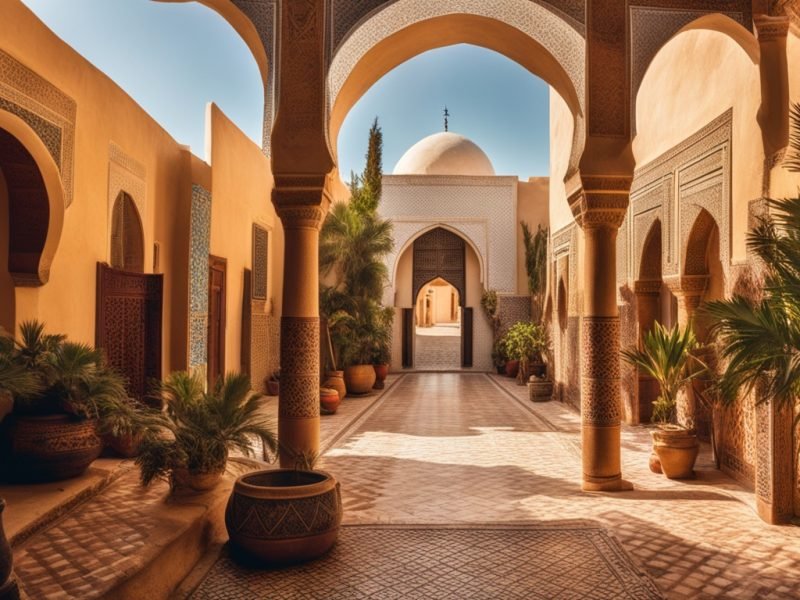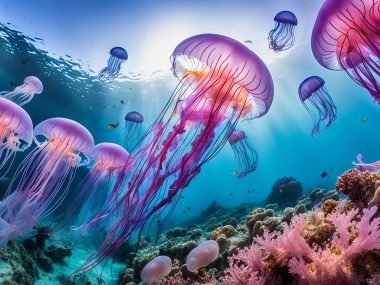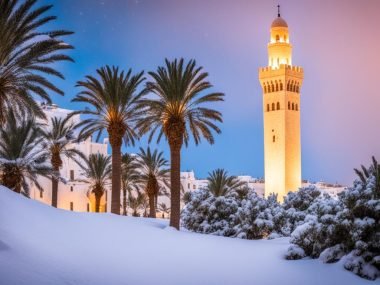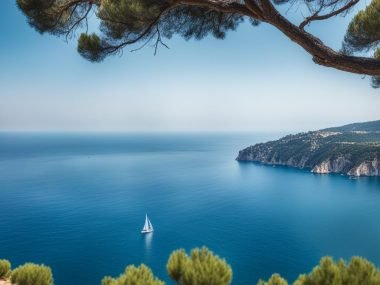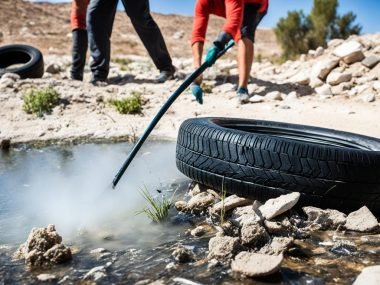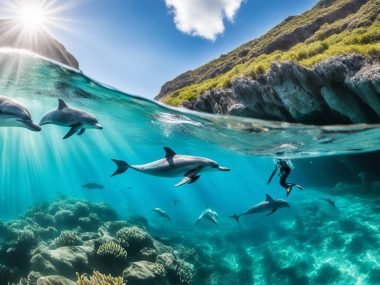Did you know Morocco welcomes over 13 million visitors each year? Meanwhile, Tunisia, with its unique charm, gets fewer than 10 million. This sparks talks about which place is better. People who love to travel and see North Africa often ponder over “Is Tunisia Better Than Morocco?” It’s a question that makes them eager to explore.
People who love journeys often compare Tunisia and Morocco. These two countries in North Africa are known for their history and varied cultures. A program by Duke University shared thoughts on both places. They pointed out similarities in buildings, beliefs, and kindness. Yet, they found differences in food and the way people talk. Getting to know these countries is special because of the sceneries, folks, and the joy of sharing meals and tales.
Key Takeaways
- Tunisia has less crowded places of history than Morocco’s busy areas.
- Both lands have a deep cultural background with unique languages and food.
- Meeting locals and seeing the nature around makes comparing them more meaningful.
- Looking closely shows the special things each country has to offer.
- Seeing the differences between Tunisia and Morocco makes a trip there more exciting.
Introduction to Tunisia and Morocco
Tunisia and Morocco show us North Africa’s rich culture. They have different landscapes and long histories. Which is more captivating: Tunisia or Morocco?
Geographic Overview
Both countries have beautiful coasts and desert lands. Their geography offers unique experiences. The greenery in Tunisia and Morocco’s Atlas Mountains are stunning.
Historical Background
Both countries have histories of being colonised and then getting independence. Tunisia became a republic in 1956. Morocco turned into a constitutional monarchy.
Common Cultural Themes
Tunisia and Morocco share many cultural aspects. Both speak Arabic, and Tunisia has a lot of French speakers. Islam influences their customs and values. Their culture shines in festivals, buildings, and daily life.
Economic Comparison
To understand the economies of Tunisia and Morocco, we look at GDP, earnings, job rates, and living costs. This shows how each country is doing economically.
GDP and Income
Tunisia has a bit more GDP per person than Morocco. This means its people earn slightly more. This comparison tells us about each country’s economic work and output.
Unemployment and Inflation
Tunisia has a higher jobless rate than Morocco, which affects living standards. Both countries face tough inflation, making life costly. Keeping inflation down is key for affordable living.
Cost of Living
Despite inflation, living in Tunisia costs less. This benefits locals and foreigners, easing money worries.
| Economic Indicator | Tunisia | Morocco |
|---|---|---|
| GDP Per Capita | Higher | Lower |
| Unemployment Rate | Higher | Lower |
| Inflation Rates | Challenged | Challenged |
| Cost of Living Index | Lower | Higher |
Tourist Attractions in Tunisia
Tunisia is a jewel in North Africa with lots to see. It boasts historical sites, lovely beaches, and unique activities. It’s a top spot for people around the world.
Historical Sites
The ancient El Jem Colosseum is really special. It looks like the famous one in Rome but is quieter. You can feel history there.
Top Beaches
Tunisia’s beaches are perfect for relaxing. Bizerte and Sousse have clear water and soft sand. They are great places for beach fans.
Unique Experiences
Tunisia has Star Wars filming locations that are awesome for fans. The Sahara Desert also offers cool adventures like camel rides and stargazing. It’s exciting for adventure seekers.
With its great places and friendly people, tourism in Tunisia is an amazing experience. It combines history, nature, and film magic into one journey.
Tourist Attractions in Morocco
Morocco has a lot for everyone. From old places to beautiful nature spots. Come to see history, nature, and life mix together.
![]()
Famous Landmarks
Marrakech’s markets are full of life. They have many things to see and hear. Casablanca’s Hassan II Mosque is also amazing. It has a big tower and beautiful art.
Cultural Attractions
Fez has an old medina, a must-see world heritage. Rabat has the Oudaya Kasbah and a lovely Royal Palace. Both show Morocco’s rich culture over the years.
Natural Beauty
Nature fans will love Morocco. The Atlas Mountains offer great hikes and views of Berber villages. The coast has calm beaches to relax. Sahara’s sand and Anti-Atlas’s green valleys show nature’s beauty.
| Landmark | Location | Notable Features |
|---|---|---|
| Hassan II Mosque | Casablanca | Imposing minaret, exquisite craftsmanship |
| Ancient Medina | Fez | Labyrinthine alleys, historical treasures |
| Atlas Mountains | Various | Stunning hiking trails, Berber villages |
| Oudaya Kasbah | Rabat | Historical architecture, Royal Palace |
Morocco is full of wonders. Iconic spots and diverse attractions make the trip memorable. It’s a journey full of culture and nature.
Quality of Life
Looking into life in Tunisia and Morocco means checking healthcare, education, and safety. Each place has good and bad points that affect how well people live.
Healthcare
Tunisia is ahead in healthcare. It has more hospital beds for its people, which means better care. Morocco is getting better but isn’t there yet. Here are some key differences:
| Parameter | Tunisia | Morocco |
|---|---|---|
| Hospital Beds per 1,000 residents | 2.1 | 1.1 |
| Healthcare Index Score | 59.32 | 56.41 |
Education
Education in both countries has its highs and lows. Tunisia’s schools are quite good. Morocco has a lot of young people, making it lively. Both are working to make learning better.
Safety and Security
Safety is key for a good life. Tunisia is mostly safe, says the British government. But be careful near borders. Morocco is also safe but faces its own issues. Both are working hard to keep people safe.
Social and Cultural Life
In Morocco and Tunisia, social life is very important. It is full of vibrant traditions and a strong sense of togetherness. People celebrate many things together. They enjoy weddings, religious events, and festivals with joy.
They respect their elders a lot. They also love welcoming others into their homes. This creates a world where everyone feels connected.
These countries have a rich history. This history shapes how people treat each other today. Being nice and respectful is key in their daily lives. From these actions, we see the core of who they are.
Morocco and Tunisia are a mix of old and new. Their customs have deep roots but they keep changing. This mix tells us what being Moroccan or Tunisian is all about.
Is Tunisia Better Than Morocco?
Deciding if Is Tunisia Better Than Morocco? relies on what you like. Tunisia offers quiet, historic spots and lovely seasides. Places like the El Jem Colosseum and beaches at Bizerte and Sousse are top spots.
Morocco pulls people in with its mix of cities and sites. Busy markets in Marrakech and the old medinas of Fez are exciting. Plus, the Atlas Mountains and calm beaches add to the adventure.
Comparing Tunisia and Morocco shows they’re different in costs, life quality, and what visitors get. Tunisia is more budget-friendly. Morocco has more cultural spots, attracting those looking for varied experiences.
Looking at both places, each has something special. The right choice depends on what you’re after in scenery, culture, and price. Think well about what you prefer to make a smart pick.
| Aspect | Tunisia | Morocco |
|---|---|---|
| Historic Sites | Less crowded, e.g., El Jem Colosseum | Bustling, e.g., Marrakech Souks |
| Coastlines | Pristine beaches at Bizerte and Sousse | Serene beaches along the coastline |
| Cultural Attractions | Historical and less commercial cultural exploration | Diverse and vibrant cultural experiences |
| Cost of Living | Generally lower | Moderate |
Food and Cuisine
Going on a food journey through Morocco and Tunisia is exciting. We see a blend of tastes and traditions. The food culture in each country shows their history, trades, and local food.
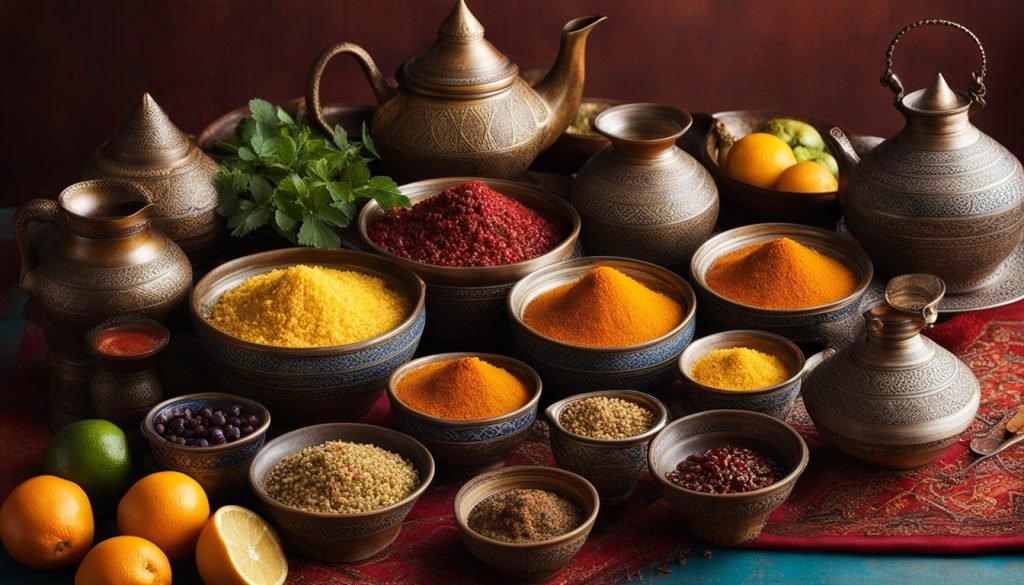
Moroccan Cuisine
Moroccan food is famous for its rich tastes. It uses lots of spices in dishes like flavourful Moroccan dishes. Tagine and couscous are big favourites. They use lemon, olives, and dry fruits to make meals special. Every dish is a gastronomic delight.
Tunisian Cuisine
Tunisian meals mix Arabic, Berber, and French food ways. Spicy harissa and brik (a yummy stuffed pastry) show this mix. Couscous is big in Tunisia too, with different spices and herbs.
Dining Experiences
Eating in North Africa brings people together. It’s a big part of their dining culture. In Morocco, families share meals from a majmar (clay pot). They also enjoy mint tea together. Tunisia has a mix of European and traditional ways of eating. But, it still focuses on sharing and enjoying food together.
Trying Moroccan or Tunisian food is a trip through history and today’s culture. It’s a great experience.
Language and Communication
Learning about the languages in Tunisia and Morocco makes our trips better. These countries use their many languages to make tourists feel welcome.
Official Languages
Arabic is the main language in Tunisia. But, French is also common because of history. This helps travellers, especially if they know French. Morocco also values Berber and Arabic as key languages. This shows their rich language mix.
Dialects
The Arabic in Tunisia and Morocco is different. Tunisian Arabic mixes with French and Italian. Moroccan Arabic includes Berber and Spanish. These differences show the unique cultures of each country.
Language for Tourists
Travelling in these countries, we often hear English in places for tourists. Even though not everyone is fluent, the locals are very welcoming. This makes it easier to talk while travelling. The mix of Arabic, French, and English makes visiting these places special.
Travel and Transportation
Travel in Tunisia and Morocco is unique because of their cultures and how they move around. In Tunisia and Morocco, you’ll find different ways to travel.
In Tunisia, it’s easier to enter for lots of people without a visa. You can travel in “louages”, which are vans you share with others. They’re cheap and popular. Renting a car is another option, but some roads are tough to drive on. This makes travelling in Tunisia interesting and fun.
In Morocco, you get old and new ways to travel. You can take grand taxis, buses, or modern trains. The trains connect big cities like Casablanca, Rabat, and Marrakesh. They make travelling easy. For trips to far places, buses and private cars are good choices. They offer freedom and comfort.
Both countries have great ways to travel. Each one makes your trip special. Below is a table that shows the differences in Tunisia and Morocco:
| Aspect | Tunisia | Morocco |
|---|---|---|
| Visa Requirements | Visa-free for many nationalities | Visa-free for selected nationalities |
| Local Transport Options | Louages, buses, car rentals | Grand taxis, buses, modern trains |
| Road Conditions | Challenging in some areas | Generally better, especially in cities |
| Rail Connectivity | Limited | Extensive |
Looking at how to travel in these countries shows they’re both appealing. Each has its perks for travellers. Knowing about these will make your trip better and more fun.
Climate and Weather
Tunisia and Morocco have different climatic conditions that attract travellers. They range from lovely Mediterranean climates to the hot desert. These weather patterns are key when planning seasonal travel.
Temperature and Seasons
Tunisia and Morocco have their own weather styles. Tunisia often has warm days, especially near the sea. Morocco, on the other hand, has cool mountain air and hot desert days.
Best Times to Visit
Knowing the best tourism timings can make your trip great. Both countries are best in spring and autumn. With nice weather and not many tourists, places like Tunisia’s beaches and Morocco’s mountains are perfect.
| Country | Optimal Season | Climate Highlights |
|---|---|---|
| Tunisia | Spring, Autumn | Mediterranean coastlines, mild temps |
| Morocco | Spring, Autumn | Atlas Mountains’ coolness, desert warmth |
Conclusion
Tunisia and Morocco are both amazing countries in North Africa. Each place has its own special charm. They make us appreciate their beauty, culture, and history more.
People choose where to go based on what they like. Tunisia is great for a calm trip. It has lovely beaches and not so crowded historical spots. Morocco is full of life. Its cities are busy and its culture is rich, perfect for those who love to explore.
Both countries have a lot in common like the weather and their history. Yet, they are unique in many ways. Tunisia is known for its healthcare and French-touched food. Morocco has beautiful mountains and peaceful beaches. Both promise unforgettable trips.
In the end, choosing between Tunisia and Morocco depends on what you prefer. Whether you’re drawn to Tunisia’s quiet beauty or Morocco’s lively culture, you’ll find joy in the adventure. These places are must-visits for anyone who loves to travel.

